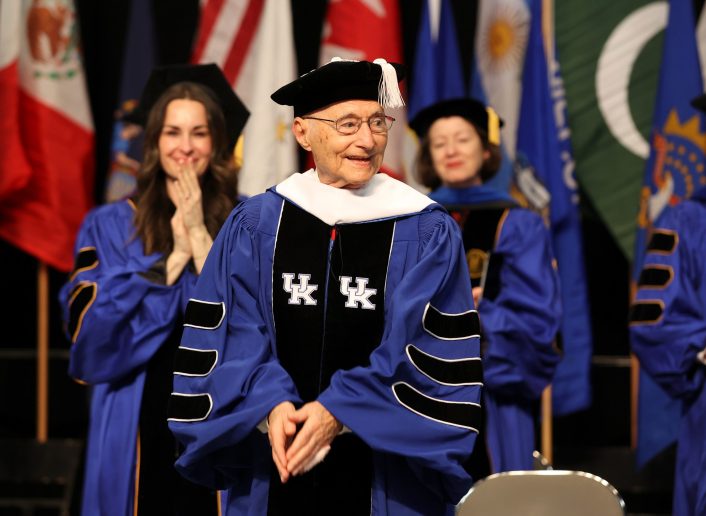Appalachian attorney honored for ‘unending commitment’
Published 4:19 pm Thursday, February 8, 2024

- John Rosenberg received an Honorary Degree at Graduation on December 15, 2023. (Photo by Mark Cornelison / University of Kentucky)
|
Getting your Trinity Audio player ready...
|
By Liz Carey
The Daily Yonder
John and Jean Rosenberg thought they’d stay a few years in Eastern Kentucky and then move on. Fortunately for families throughout the region, those “few years” turned into more than half a century – and counting.
In 1970, John Rosenberg had spent eight years as a civil rights attorney with the U.S. Attorney’s office. He and his family were returning from a camping trip in Canada and were on their way to visit Jean’s parents in Florida. He got a call about a position with a new program to provide legal assistance to poor people in Eastern Kentucky. He and Jean decided the opportunity was worth a detour. They camped at Jenny Wiley State Park near Prestonsburg, Kentucky, to learn more about the job.
“We thought this would certainly be something worthwhile to do for what we thought would be maybe a couple of years or so,” he said in an interview with the Daily Yonder. “I hoped that we could recruit a good group of lawyers and I’d be able to use (my) skills to take on some of this work for low-income people here in the region.”
Now, 54 years later, Rosenberg’s influence has had a measurable impact on the region. From his work protecting the rights of coal miners to representing people who couldn’t otherwise afford legal assistance, his efforts have changed lives. In December 2023, Rosenberg received an honorary doctorate in humane letters from the University of Kentucky, recognizing his work for civil rights and the people of Kentucky.
“He has been an incredible force for change in Kentucky, specifically in the Appalachian region,” UK President Eli Capilouto said in a press release. “… Dr. Rosenberg’s commitment to advancing Kentucky is unending.”
At 92, Rosenberg continues to affect rural Kentucky through his advocacy and community service activities.
“I don’t know what I’d do if I wasn’t doing this,” he said.
Rosenberg was born in Magdeburg, Germany, in 1932, the year before Adolph Hitler was named chancellor. Rosenberg and his family endured Kristallnacht and the destruction of their synagogue. They narrowly escaped the Holocaust, spending a year in an internment camp in Rotterdam before immigrating to Spartanburg, South Carolina, just ahead of the Nazi invasion of the Low Countries. Although they had fled Germany for their lives, in Spartanburg they were under government scrutiny as “aliens of enemy nationalities.”
A small piece of paper in his records illustrates the family’s struggle in their new home. That paper, permission for his mom to travel to New York City to visit her mother, followed an FBI search of their apartment and the seizure of his father’s monocle and a radio that agents feared could have been used to communicate two ways. At the same time, his family’s apartment was where Jewish soldiers would come to worship on Saturdays while his father acted as a para-rabbi.
After high school, Rosenberg was the first member of his family to go to college – Duke University – where he was in the U.S. Air Force Reserve Officers’ Training Corps (ROTC). He served as an Air Force navigator and instructor after graduation.
He credits his time in the military as an initial inspiration for his civil rights work.
“When I was in the military, there were several things that happened over the course of time that really made me want to try to work in some way to help undo the caste system in the South,” he said.
During a trip to bring back a seaplane from where he was stationed in London, he spent time with a Black crew member named Abe Jenkins, who was on his way home to Charleston, South Carolina. The two men sat together and talked as they flew across the Atlantic. But once they reached America, things changed, he said.
“We were in full uniform. When we got to Washington, D.C., Abe got up and said, ‘Well, I’ll see you when we get back to England,’ ” Rosenberg said. “I asked him where he was going and he said, ‘I’m going to the back of the train where the blacks sit.’ It was pretty profound. I think it was really one of the defining moments, in some ways, of my life.”
After the military, he studied law at the University of North Carolina at Chapel Hill, graduating at the height of the civil rights movement. He went to work as an attorney in the U.S. Attorney’s office in the Civil Rights Division, where he litigated racial discrimination cases, including the case that would later be the center of the movie “Mississippi Burning.”
With that experience under his belt, and after his detour to interview for a job in Eastern Kentucky, he became director of the Appalachian Research and Defense Fund of Kentucky, now known as AppalReD Legal Aid. There, he oversaw the organization’s operation and expansion for more than 30 years. After retiring in 2002, Rosenberg founded the Appalachian Citizens Law Center (ACLC) to address coal-related matters for residents there.
Now five decades after that camping trip diversion, he’s still in Prestonsburg and still working. Evan Smith, advocacy director of AppalReD, said Rosenberg still helps out those around him.
“He has been formally retired… for more than 20 years here at AppalReD,” he said in an interview with the Daily Yonder. “I would say he at least stops by more weeks than not.”
Some of that is adding his name to cards of thanks to people who’ve donated to AppalReD in his name. Some of it is helping a low-income resident with legal troubles, Smith said.
Smith said it’s Rosenberg’s willingness to fight the long fight that sets him apart.
“If I had to really try to boil it down, I think he has a kind of quiet patience and perseverance that is just unparalleled,” he said. “He has a way of getting (things) done that often takes multiple years.”
Outside of his legal work, Rosenberg has served on numerous boards and committees — from the Kentucky Public Advocacy Commission to the Board of Regents of Morehead State University and the stakeholder advisory board for the UK Center for
Appalachian Research in Environmental Sciences, to name just a few. Officials said his work in the region has changed thousands of lives.
In December, the University of Kentucky President conferred the Honorary Doctor of Humane Letters to Rosenberg.
“He has been an incredible force for change in Kentucky, specifically in the Appalachian region,” Capilouto said in a statement. “Dr. Rosenberg’s commitment to advancing Kentucky is unending.”
For his part, Rosenberg said he’s proud of the work he’s done providing those in Appalachia with legal representation. And he’s not ready to stop yet.
“I’d like to think I could keep doing this,” he said. “We don’t want to fool ourselves into thinking that we’re somebody’s savior. We’re not. I just think we’re trying to continue doing what we’re doing.”






